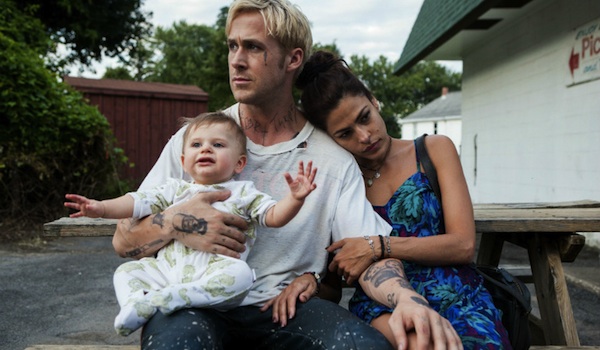The Place Beyond the Pines Review
“So Jesus said to them, ‘Truly, truly, I say to you, the Son can do nothing of his own accord, but only what he sees the Father doing. For whatever the Father does, that the Son does likewise.'” —John 5:19
Derek Cianfrance burst onto the American independent movie scene with 2010’s searing Blue Valentine, and he’s back with 2013’s first great film, The Place Beyond the Pines. This brooding, moody film sprawls generations of cops and criminals in Schenectady, New York. In three distinct acts, it tells a story of damaged bonds between fathers and sons and the things some men will do to maintain or strengthen those bonds.
In Act One, we meet Luke Glanton (Ryan Gosling), a stunt motorcycle rider who finds out, while performing in Schenectady, that he’s fathered a child with a former flame, Romina (Eva Mendes). Still clearly scarred by his own father’s abandonment, Luke quits his job to stay put in Schenectady and take care of little Jason and his mother. But because he’s virtually penniless and without any real skills, he takes to robbing banks.
His path crosses that of Avery Cross (Bradley Cooper), a Schenectady cop and the star of Act Two. Though he’s only on the job six months, Cross is almost frighteningly ambitious. His father is a retired New York State Supreme Court justice, and though he too has a law degree, he likes life in his police blues—at least until he gets shot in the line of duty. He’s called a hero following the incident, but only he knows what really happened, and it haunts him as he confronts some thoroughly corrupt colleagues.
The Place Beyond the Pines‘ final act takes place 15 years in the future, when troubled teen A.J. (Emory Cohen) moves in with his father, an up-and-coming politician. At school, he (somewhat surprisingly) connects with a loner, Jason (Dane DeHaan) over their mutual love of getting high. But a common link in their past threatens to completely disrupt their lives.
The film starts with a real bang—a spectacular and seemingly impossible tracking shot that follows Gosling’s Luke as he zigzags around a carnival on his way to a the site of his big motorcycle stunt. The shot makes it seem as if Gosling is actually performing the stunt, and while the shot itself doesn’t serve any real thematic purpose, it sets the stage for a film that’s as technically proficient as it is emotionally satisfying. Handheld camerawork dominates much of the film—including a spectacular chase that occurs just before Act One transitions into Act Two. The way Cianfrance uses sound, too, is noteworthy. You’ll feel profoundly unsettled by the noise of Luke’s bike as he speeds away from the scene of a crime.
One of the chief pleasures of Cianfrance’s last film was watching Ryan Gosling at his most naturalistic. It was a thing to behold, and he’s nearly as good here. In his absence, Romina has found a surrogate father for their child, a kindly man named Kofi (Mahershala Ali). While the boy is getting baptized, Kofi holds him and Luke is left to cry in the back of the church. It’s a moving moment that says everything that needs to be said about Gosling’s character. The mere knowledge that he has a kid truly changes him, but it’s too much too fast. The guy doesn’t know how to be the person he needs to be, the person he wants to be. Watching Gosling try to figure it out, however, is pretty incredible.
Bradley Cooper, coming off his first Oscar nomination for Silver Linings Playbook, carries the film through its middle third like a champ. Avery’s plight is quite different than Luke’s. His relationship is stable and he has a steady paycheck coming in. But he finds himself with the lives and livelihoods of other men in his hands, and the decisions he makes reverberate through the years in obvious and sometimes not-so-obvious ways.
The film ultimately succeeds because its scope is so grand. It’s telling the stories of multiple lives in startlingly complete ways. What we don’t explicitly know about them can be easily surmised thanks to what is on the screen, and in the end, both their greatest successes and their downfalls can be traced back to a handful of moments. It’s heady stuff to consider, and as presented by Cianfrance, it’s a monumental moviegoing experience.

















One Response to The Place Beyond the Pines Review